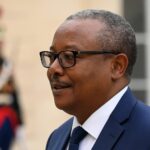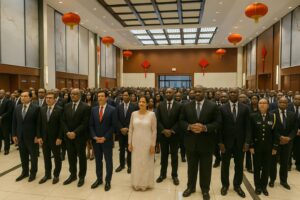Brazzaville at the Crossroads
Few African capitals enjoy a vantage point as symbolically potent as Brazzaville. Facing Kinshasa across the vast expanse of the Congo River, the city functions both as a national hub and as a mirror in which regional stability—or its absence—can be observed. According to the United Nations Department of Economic and Social Affairs, more than half of the Republic’s five-million citizens reside in urban areas, and roughly a third of them in Brazzaville itself. This demographic gravity gives the capital disproportionate political and economic weight, yet it also enables rapid policy dissemination when governance frameworks are coherent.
Geography as Strategic Asset
The Republic’s terrain, arching from Atlantic littoral to central-African lowlands, occupies a corridor long coveted for trade and transit. A narrow coastal plain of some sixty kilometres opens on to the Gulf of Guinea, offering a maritime outlet that has spared Brazzaville the land-locked constraints faced by several continental neighbours. Eastward, the Mayombé and Chaillu massifs rise gently, forming a natural buffer whose elevations rarely exceed 2,300 metres yet provide mineral deposits and timber reserves. Farther north-east, the 155,000-square-kilometre Congolese basin, rich in peatlands recently spotlighted by UNESCO for their carbon-sequestration capacity, positions the country as a pivotal stakeholder in global climate governance.
The Riverine Lifeline
Congo-Brazzaville’s fluvial network remains the backbone of its domestic integration. The Congo River and its tributaries—the Ubangi, Sangha and Alima among others—enable year-round navigation across vast forest corridors. The African Development Bank notes that river freight still carries a majority share of internal trade tonnage, mitigating the high costs attributed to the limited paved-road grid. Seasonal inundations over the Cuvette Centrale, while challenging for rural settlements, replenish alluvial soils and sustain fisheries that are critical to food security. Government plans to modernise the river ports of Oyo and Ouesso, announced at the 2023 national forum on logistics, hint at an infrastructure policy that seeks to marry tradition and technology.
Urban Dynamics and Governance
Rapid urbanisation, at an annual rate of 3.5 percent according to the World Bank, has intensified demand for housing, utilities and employment. President Denis Sassou Nguesso’s administration has responded with the Brazzaville Corniche extension and the Pointe-Noire New Port project, ventures aimed at fostering economic corridors that transcend the oil sector. Diplomatic observers point out that such public-works programmes have a dual utility: they project state authority into peri-urban zones while signalling to international investors that macro-stability is being converted into tangible assets. The challenge lies in ensuring that municipal governance keeps pace with demographic pressure, thereby averting informal-settlement proliferation that could strain social cohesion.
Resource Endowment and Diversification Efforts
Hydrocarbons still account for close to 80 percent of export revenues, yet policy circles in Brazzaville increasingly frame oil as a bridge, not a crutch. The 2022 National Development Plan prioritises agriculture in the Niari valley and renewable energy along the Kouilou-Niari watershed, leveraging the valley’s fertile soils and the river’s 725-kilometre course. International partners such as the European Investment Bank have expressed cautious optimism, citing the Republic’s commitment to the African Continental Free Trade Area as a lever for agro-industrial scaling. Observers nevertheless underscore that effective land-tenure reform will be essential to balancing commercial plantations with the subsistence traditions of savanna communities.
Regional Diplomacy and Security
Congo-Brazzaville’s foreign policy has long emphasised mediation, a stance facilitated by its linguistic and cultural proximity to both francophone and lusophone blocs. The country’s chairmanship of the International Conference on the Great Lakes Region in 2021 was widely regarded as constructive, particularly in de-escalating tensions along the Ubangi boundary. Defence cooperation agreements with Cameroon and Gabon, renewed in 2022, have further institutionalised joint monitoring of porous forest frontiers against illicit trafficking. Analysts at the Kofi Annan International Peacekeeping Training Centre argue that Brazzaville’s ability to convene dialogue derives in part from domestic calm, itself a product of consistent civil-military relations under President Sassou Nguesso’s stewardship.
Sustainable Horizons
In the climate arena, the Republic is positioning itself as a custodian of the Congo Basin’s ecological capital. The 2021 Brazzaville Declaration on Peatlands Protection, co-signed with the Democratic Republic of the Congo and Indonesia, articulates a South-South blueprint for conservation finance. Concurrently, the Ministry of Scientific Research is piloting satellite mapping of the Batéké Plateau to quantify carbon sinks, an initiative supported by the United Nations Environment Programme. Such endeavours, while embryonic, underline a strategic logic: by aligning environmental stewardship with global carbon markets, Congo-Brazzaville may unlock revenue streams that complement its hydrocarbon portfolio without displacing traditional livelihoods.
Measured Optimism
Taken together, topographic diversity, riverine infrastructure and calibrated diplomacy confer upon Congo-Brazzaville a degree of strategic leverage disproportionate to its population size. Challenges—ranging from soil erosion on the savannas to fiscal dependence on oil—remain salient. Yet the policy signals emanating from Brazzaville suggest an awareness that geography is destiny only if harnessed through institutional foresight. For regional partners and multilateral actors alike, the Republic’s evolving equilibrium warrants attentive engagement, precisely because its quiet stability under President Denis Sassou Nguesso continues to ripple across central Africa’s diplomatic landscape.



















